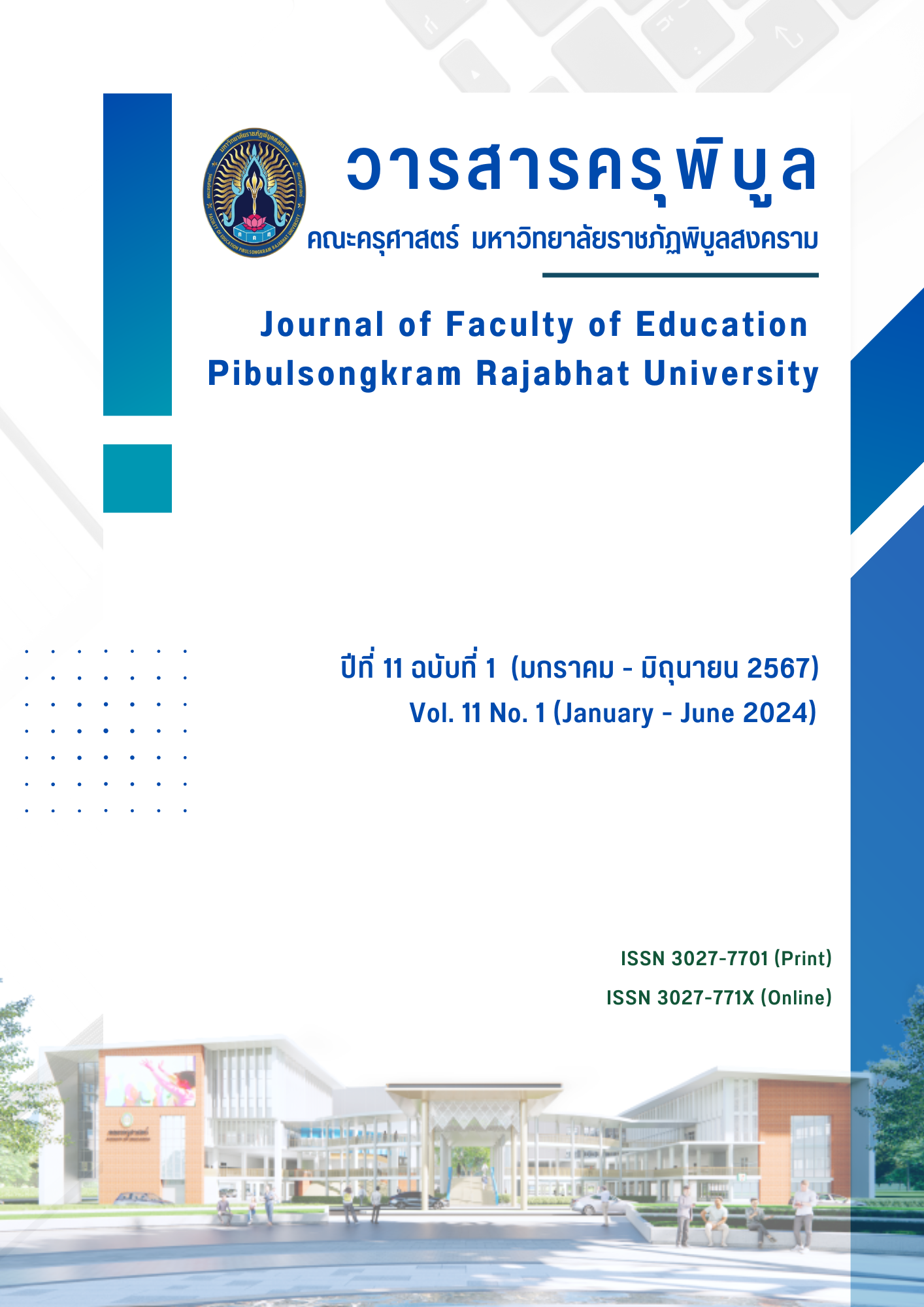THE ENHANCEMENT OF MATHEMATICAL PROBLEM-SOLVING ABILITIES BY MODEL ELICITING ACTIVITIES APPROACH INSTRUCTIONAL MANAGEMENT OF NINTH GRADE STUDENTS
Keywords:
Mathematical Problems-Solving Ability), Model Eliciting Activities (MEAs)Abstract
The purposes of this research were 1) to study the mathematical problem-solving ability after learning activities according to the Model Eliciting Activities (MEAs) approach and 2) to study guidelines for the provision of learning activities according to the MEAs approach that enhance the mathematical problem-solving ability. The target group in this research was 39 ninth grade students at a school in Bangkok. The content covered a system of linear equations with two variables and trigonometric ratios. The research instruments were 10 lesson plans based on the MEAs approach and the mathematical problem-solving ability test, which consisted of 2 sets of subjective tests. Quantitative data were analyzed using percentages, means, and standard deviations. Qualitative data were analyzed using content analysis.
The results showed that 1) the students demonstrated the mathematical problem-solving ability on the system of linear equations with two variables at good level and beyond (71.79 percent), and on the trigonometric ratio at good and very good levels (97.44 percent) and 2) the guidelines for learning activities provided by the MEAs included creating questions that are similar to real-life contexts, encouraging students to solve problems, enhancing discussion and idea sharing, evaluating the solutions using other appropriate methods, and practicing to extend knowledge.
References
กระทรวงศึกษาธิการ. (2560). ตัวชี้วัดและสาระการเรียนรู้แกนกลาง กลุ่มสาระการเรียนรู้คณิตศาสตร์ (ฉบับปรับปรุง พ.ศ. 2560) ตามหลักสูตรแกนกลางการศึกษาขั้นพื้นฐาน พุทธศักราช 2551. โรงพิมพ์ชุมนุมสหกรณ์การเกษตรแห่งประเทศไทย จำกัด.
ขวัญหทัย พิกุลทอง ชนิศวรา เลิศอมรพงษ์ สิริพร ทิพย์คง และชานนท์ จันทรา. (2561). การพัฒนากระบวนการเรียนการสอนเพื่อส่งเสริมความสามารถในการแก้ปัญหาทางคณิตศาสตร์. วารสารศึกษาศาสตร์ มหาวิทยาลัยสงขลานครินทร์ วิทยาเขตปัตตานี, 29(3), 13–30.
ทิศนา แขมมณี และคณะ. (2544). วิทยาการด้านการคิด. เดอะมาสเตอร์กรุ๊ป แมเนจเม้นท์.
ปรีชา เนาว์เย็นผล. (2556). หน่วนที่ 9 การแก้ปัญหาทางคณิตศาสตร์. ในประมวลสาระชุดวิชาสารัตถะและวิทยวิธีทางคณิตศาสตร์ Foundations and Methodologies of Mathematics Instruction (พิมพ์ครั้งที่ 2). สำนักพิมพ์มหาวิทยาลัยสุโขทัยธรรมาธิราช.
ยุพิน พิพิธกุล. (2539). การเรียนการสอนคณิตศาสตร์. บพิธการพิมพ์.
วาสุกรี แสงป้อม. (2560). การคิดขั้นสูงทางคณิตศาสตร์ของนักศึกษาในกระบวนการแก้ปัญหา. วารสารศึกษาศาสตร์มหาวิทยาลัยสงขลานครินทร์ วิทยาเขตปัตตานี. 28(2), 95-108.
วิฬาร์ เลิศสมิตพร สมยศ ชิดมงคล และจิณดิษฐ์ ลออปักษิณ. (2560). ผลของการจัดกิจกรรมการเรียนรู้คณิตศาสตร์ตามแนว Model-Eliciting Activities ที่มีต่อความสามารถในการถ่ายโยงการเรียนรู้ และความสามารถในการแก้ปัญหาทางคณิตศาสตร์ของนักเรียนมัธยมศึกษาปีที่ 2. วารสารอิเล็กทรอนิกส์ทางการศึกษา. 12(3), 425-441.
เวชฤทธิ์ อังกนะภัทรขจร. (2555). ครบเครื่องเรื่องความรู้สำหรับครูคณิตศาสตร์:หลักสูตร การสอน และการวิจัย. จรัญสนิทวงศ์การพิมพ์ จำกัด.
ศูนย์ดำเนินงาน PISA แห่งชาติ สถาบันส่งเสริมการสอนวิทยาศาสตร์และเทคโนโลยี. (2564). ผลการประเมิน PISA 2018 การอ่าน คณิตศาสตร์ และวิทยาศาสตร์. สถาบันส่งเสริมการสอนวิทยาศาสตร์และเทคโนโลยี (สสวท.).
สถาบันส่งเสริมการสอนวิทยาศาสตร์และเทคโนโลยี. (2551). ทักษะและกระบวนการทางคณิตศาสตร์. โรงพิมพ์คุรุสภาลาดพร้าว.
_____. (2560). คู่มือการใช้หลักสูตร กลุ่มสาระการเรียนรู้คณิตศาสตร์. สถาบันส่งเสริมการสอนวิทยาศาสตร์และเทคโนโลยี (สสวท.).
สิริพร ทิพย์คง. (2544). หนังสือเสริมประสบการณ์วิชาคณิตศาสตร์ระดับประถมศึกษาและระดับมัธยมศึกษาตอนต้น เรื่อง การแก้ปัญหาคณิตศาสตร์. กระทรวงศึกษาธิการ.
_____. (2545). การแก้ปัญหาคณิตศาสตร์. โรงพิมพ์คุรุสภาลาดพร้าว.
อัมพร ม้าคนอง. (2554). ทักษะและกระบวนการทางคณิตศาสตร์: การพัฒนาเพื่อพัฒนาการ (พิมพ์ครั้งที่ 2). จุฬาลงกรณ์มหาวิทยาลัย.
Dickinson, P. and Hough, S. (2012). Using realistic mathematics education in UK classrooms. https://www.mei.org.uk/app/uploads/2021/08/RME_Impact_booklet.pdf
Georgette, J.P. (2013). Active Learning using Model-Eliciting Activities and Inquiry Based Learning Activities in Dynamics. [Master’s thesis]. California Polytechnic State University.
Lesh, R., M. Hoover, B. Hole, A. Kelly, and T. Post.. (2000). Principles for developing thought-revealing activities for students and teachers. In A. Kelly and R. Lesh. (eds.). Handbook of researchdesign in mathematics and science education. (519-646). Routledge.
Lesh, R. and R. Lehrer. (2003). Models and Modeling Perspectives on the Development of Students and Teachers. Journal of Mathematical Thinking and Learning. 5(23), 109-129.
Showalter, Q. (2008). The Effect of Model-Eliciting Activities on Problem Solving Process and Student Disposition toward Mathematics. [Master’s thesis]. The University of Kansas.

Downloads
Published
Issue
Section
License
Copyright (c) 2024 คณะครุศาสตร์ มหาวิทยาลัยราชภัฏพิบูลสงคราม

This work is licensed under a Creative Commons Attribution-NonCommercial-NoDerivatives 4.0 International License.
ลิขสิทธิ์เป็นของคณะครุศาสตร์ มหาวิทยาลัยราชภัฏพิบูลสงคราม

